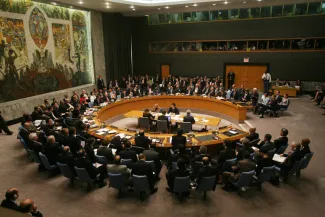UN Security Council Reform

Overview
The UN Security Council, created more than fifty years ago, has primary responsibility for the maintenance of international peace and security. Some experts argue that the current structure of the UN Security Council, formed in the aftermath of World War II, does not reflect today’s geopolitical reality. As a result, the legitimacy, effectiveness, and representativeness of the Security Council has been subjected to ongoing debate. The United States will need to decide where it stands on the issue of UN Security Council reform.
Students will learn about the history of the UN Security Council and the debate surrounding its reform.
Students will understand the challenges in the development and management of international institutions and international order.
The Situation
The UN Security Council, which forms one of the six principal organs of the United Nations, is charged with ensuring global peace and security. Formed in 1945 in the wake of World War II, the body brought together the major world powers that shaped the geopolitical system at the time. It elevated five countries as “permanent” members—the United States, China, France, Russia, and the United Kingdom, with significant influence in determining international decisions. Other countries rotate as “nonpermanent” members.
When it was founded, the Security Council aimed to address the failing of the League of Nations to maintain world peace. With the goal of strengthening the organization based on the realities of economic and military influence, including its permanent members’ nuclear capabilities, the council armed the five permanent members with a veto power for any “substantive” resolution.
In his remarks to the UN Security Council in 2022, U.S. President Joe Biden said, “I also believe the time has come for this institution to become more inclusive so that it can better respond to the needs of today’s world.” Biden’s statement reflects growing concerns that the institution is out of date.
Critics call for a reboot of the UN Security Council through structural reforms. To some, the UN Security Council reinforces existing inequities in the international system. For example, none of its permanent members represents low- or middle-income countries. The Security Council also does not reflect all world regions (noticeably absent, for instance, are any permanent members from Africa, Central and South America, or the Middle East). Furthermore, the Security Council is often paralyzed by division between blocs. Russia and China, for example, have used their veto power to stop several attempts by the council to enact resolutions in Syria and Ukraine. As it stands, the organization has had arguably limited success in thwarting or responding to wars and humanitarian crises. This suggests that change may be necessary to enable more effective solutions.
Still others insist that reform is risky and that the status quo is simply the best option. If membership is changed or expanded, they ask, then which countries should be elevated as new permanent members, and according to what criteria? To those who oppose UN Security Council reform, no acceptable alternative exists—selecting any new permanent members would be too politically difficult, making consensus impossible. Further, adding more members could make the council more like the General Assembly, the United Nations’ only universally representative body. That move could be more equitable but could also risk building another ineffective bureaucracy that struggles to make decisions and lacks credibility, ultimately shrinking its influence.
Decision Point
The United States needs to consider its position on UN Security Council reform—whether it should stand at the forefront of reform and push for a new era, resist modification and recommend maintaining the current status quo, or try an altogether different approach.
NSC members should consider the following policy options:
- Promote maintaining the current UN Security Council architecture. Holding fast to the status quo could help the U.S. maintain its power and avoid risky alternatives. Doing so would risk failing to respond to growing criticism about the organization’s ability to play a meaningful role in peacekeeping. Likewise, if a reform movement were to take root, the U.S. may have less credibility to lead the design of alternatives.
- Lead an agenda to reform the UN Security Council. Leading a call for change could give the United States an advantage, allowing the country to shape reform and possibly position itself in a favorable role. Any changes to the council, however, could also come with risks and would likely diminish U.S. power in the world.
- Continue to communicate support for reform without taking substantive action. Continuing to endorse the idea of reform would likely build support for U.S. leadership on the issue among nations that feel excluded. However, that approach could spark criticism of U.S. hypocrisy if words are not followed with action. Such criticism could damage U.S. influence abroad.
Additional Resources
- Reforming the United Nations Security Council: Increasing Equality in the Inter… Georgetown Journal of International Affairs
- Why “Reforming” the United Nations Security Council Is a Bad Idea Council on Foreign Relations / Pressure Points
Need inspiration for how to structure your Mini Simulation?
More Mini Simulations


